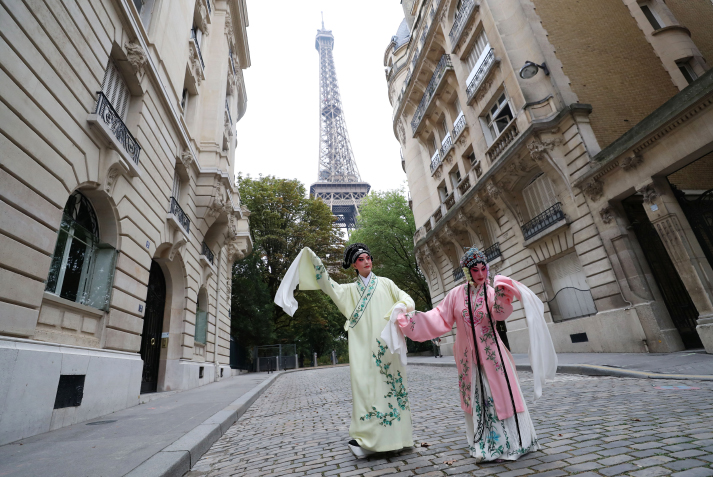| Voice |
| Advancing Sino-French relations toward another 60 years of success | |
|
|
 Kunqu Opera actor Shi Xiaming (left) and actress Kong Aiping stage a performance near the Eiffel Tower in Paris, France, on September 13, 2023 (XINHUA)
Guided by our visionary leaders Chairman Mao Zedong and General Charles de Gaulle, China and France broke through the barriers of the Cold War and established diplomatic relations on January 27, 1964. The event constituted "a diplomatic nuclear explosion," according to Western media observers of that time. During the following 60 years, the two countries have upheld the principles of independence, mutual understanding, strategic vision, and mutual benefit, a commitment they made when establishing diplomatic ties. These principles have allowed bilateral relations to stand the test of changing times, and remain at the forefront of China's relations with the Western world. France can claim many "firsts" in its relationship with China. It was the first major Western country to establish a comprehensive partnership and conduct strategic dialogue with China, open a cultural center and hold the Year of Culture with China reciprocally, establish commercial flights to and from China, start cooperation in civilian nuclear energy, and explore the third-party market cooperation with China. Sino-French relations have set a shining example of how countries with different systems, civilizations, and levels of development can achieve peaceful coexistence and mutual benefit. Over the years, economic and commercial cooperation between the two countries has continued to grow ever closer. Today, France is China's third largest trading partner and the third largest source of actualized investment in the European Union, while China is France's top trading partner in Asia and seventh largest trading partner worldwide. High-quality French products, such as Airbus planes, Bordeaux wines, L'Oréal beauty products and cheese in all its varieties, are becoming increasingly popular among Chinese consumers. At the same time, China-made products are becoming more and more popular in France each year, particularly Chinese mobile phones from brands including Huawei, Honor, and Xiaomi, and Chinese electric cars, such as those manufactured by BYD and Morris Garages. The friendship between the two peoples has grown stronger over the past decades. China is now one of the main sources of international students in France—nearly 30,000 Chinese studied in France in 2022. Close to 1,000 French primary and secondary schools are offering Chinese language courses, teaching over 100,000 students. The Eiffel Tower in Paris and lavender fields in Provence fascinate Chinese tourists, while the Great Wall in Beijing and the Terracotta Warriors in Xi'an amaze French travelers. France and China have demonstrated a strong sense of responsibility as major countries in international affairs. They have maintained close consultation on hot-button issues, such as the Israeli-Palestinian conflict, and global challenges like climate change and the protection of biodiversity. Together they defend multilateralism and international equity and justice. In 2015, the two countries made joint efforts to promote the adoption of the historic Paris Agreement at the UN Climate Change Conference, making a historic choice at a critical moment for the collective wellbeing of humanity.  A child waits outside Beauval Zoo in Saint-Aignan, France, on July 25, 2023, ready to wish Yuan Meng, the first giant panda born in France, a bon voyage for his return to China (XINHUA)
In 2023, under the strategic leadership of the two heads of state Xi Jinping and Emmanuel Macron, Sino-French relations yielded fruitful results. President Macron paid a second visit to China in three years, and Chinese Premier Li Qiang chose France for his first overseas trip after taking office, during which he attended the Summit for a New Global Financing Pact in Paris. The two countries held strategic dialogues, high-level economic and financial dialogues, and high-level dialogues on people-to-people exchange, reaching consensuses on many issues. Since December 1, 2023, and for a period of one year, China is granting visa-free entry to French travelers for up to 15 days. Meanwhile, France has announced that Chinese citizens with a master's degree and at least one semester's study in the country will be eligible to apply for a five-year multiple-entry Schengen visa. These measures are expected to accelerate recovery in visits between the two countries in the post-pandemic era. Today's world is undergoing changes on a scale not seen in a century. The Berlin Wall, a divisive symbol of the Cold War and bloc politics, has already fallen, but new barriers are shooting up. Ideological confrontation is resurfacing, the practice of creating "walled-in courtyards" is on the rise, and clashes between civilizations are causing more division and destruction. These have prompted people of foresight to worry about the future of humanity. Under these circumstances, the guiding principles for the establishment of Sino-French diplomatic relations have become even more relevant; their bilateral relations, that are mature, stable, and action-oriented, are taking on greater strategic significance; and their cooperation is expanding to new fields. In a fast-changing, crisis-laden world, Sino-French relations stand out for the stability and positive energy they inject into the global landscape.  A piece from the NuNu&NoNo collection designed by Chinese fashion designer Zhang En at the China Cultural Center in Paris on October 2, 2023 (XINHUA)
This year is the 60th anniversary of China-France diplomatic relations and the Sino-French Year of Culture and Tourism, offering an opportunity to continue fostering bilateral ties from a new historic starting point. The two countries should carry forward their current good practices, work toward the future, and continue to set an example of healthy relations between major countries by upholding the principle of equality, respect and mutual trust. They should continue to build an objective, progressive understanding of each other, and maintain the partnership by transcending their differences. They must unequivocally oppose "decoupling" and supply chain disruption, and remain major players in pursuing openness and cooperation. They should take the lead in promoting multilateral collaboration in the spirit of building a community with a shared future for humanity. And they should ensure the success of people-to-people exchange activities scheduled for 2024, reinforcing their comprehensive strategic partnership and increase its vitality. Through these efforts, the two nations will continue to lead as an example of positive bilateral relations for the next 60 years and beyond. The author is the Chinese ambassador to France, and this article was first published in China Today magazine. Copyedited by G.P. Wilson Comments to dingying@cicgamericas.com |
|
||||||||||||||||||||||||||||||
|